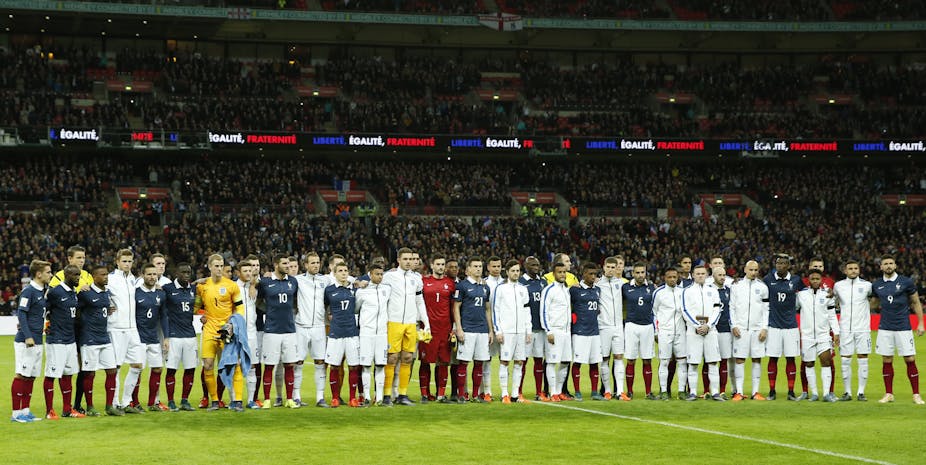The beautiful game, the global game, the people’s game – football. This great sport belongs to everyone and it unites us all.
The world’s favourite sport has enabled me to engage with so many remarkable people; it is a topic that we inevitably and irresistibly return to. My Saudi Arabian friend normally wants to ruminate on why Liverpool are not as good as they used to be. My Brazilian friend is forever telling me about “the next Pele”. My Russian friend constantly moans about how CSKA Moscow always let him down.
When the terror attacks took place in Paris, I immediately wanted to contact French friends there. Two had been at France’s football match with Germany at the Stade d’France. Thankfully, they were OK, but during this match, as we all now know, our game – and more – was almost viciously snatched away from us.
But, as the international friendly between England and France that followed showed, football, its players and the fans who follow the game will stand together, no matter what they might face.
Outside Wembley stadium there was, however, nervousness about the security situation. The same night, Belgium’s game against Spain was cancelled and Germany’s match with the Netherlands was called-off only two hours before kick-off. Reports swirled in Hannover that a bomb had been spotted in the stadium, and that an emergency vehicle packed with explosives had been found.
Disasters at the Heysal, Bradford and Hillsborough stadiums in the 1980s prompted fundamental changes in the way football stadiums are now designed, constructed, managed and secured. One senses that recent events will likely have similarly significant effects on football matches to come. Venue security is set to rapidly become one of the sport’s most important challenges, especially with the 2016 UEFA European Championship due to take place in France next summer.
It is important though that football does not let defensiveness become its default position; after all, it has the power to change lives in a positive way. In between the shock of the Stade d’France and the threat of Hannover, a game was played at Old Trafford in Manchester that most people probably did not even notice.
On the day after the Paris attacks, a Great Britain and Ireland team played a Rest of the World one in a match to raise money for UNICEF. Every year countless such games are played, and there are even more football projects across the world that bring people and communities together – across genders, ethnic groups, countries and religions.
Global cohesion
French icon Zinedine Zidane was originally due to captain the Rest of the World team, although he pulled-out of the game following the previous day’s horrific events. A member of France’s 1998 World Cup winning team, Zidane is of Kabyl Berber descent, his parents having emigrated to France from northern Algeria. France’s 1998 squad was a glorious manifestation of global cohesion, comprised of the likes of Patrick Viera, born in Senegal, and Christian Karembeu, born in New Caledonia. Many of the other players also could trace their origins to other countries, stretching from Argentina to Armenia.
In the pre-9/11 world, France’s victory showed how unifying football can be. During these more difficult times, players hold a powerful position through which they can uphold both the principles of the game and the values which the overwhelming majority of people across the world share. France needs current players such as Hatem Ben Arfa (who has Tunisian roots), Paul Pogba (whose parents are from the Republic of Guinea) and Laurent Koscielny (with his Polish origins) to serve as role models and ambassadors.
This may sound like a huge responsibility; after all these are only young men. And this is why governing bodies, clubs and fans need to play their part as well. In such a challenging environment, FIFA, football’s world governing body, really needs to eradicate the corruption that has come to characterise it.
Clubs play an important role as well, in promoting and fostering good relations across the communities in which they are based, and many are already doing good work. In an admirable show of solidarity, French Ligue 1 club Paris Saint Germain (PSG) played with the words “Je suis Paris” embroidered on its shirts. The clubs and its owners must surely know that there has to be genuine meaning behind such words. To some, football may be about investment returns and brand slogans, but the sport remains so much more deeply rooted in society and culture than this.
PSG’s owners, Qatar Sports Investments (QSI) are uniquely placed to bridge French societal divides. Indeed, it is important for QSI and other club owners across the world to understand that tragedy is not a branding opportunity. It is important that they acknowledge how deeply embedded they are in society. Clubs therefore have to show appropriate empathy, leadership and fortitude.
For many, the England-France friendly was an unprecedented emotional experience, with fans from opposing sides united in singing the French national anthem. Too often in the past, fans have been portrayed as hooligans intent on trouble, but this international game demonstrated how strong our football fraternity actually is. Moving forward from here, though, it is important that football fans maintain this identity and solidarity. And it is vital they do not succumb to the religious stereotyping, bigotry and nationalism that has sometimes blighted the sport.
At this time more than any other in recent memory, if we believe that football united will never be defeated then terrorist attacks and war will not undermine our beautiful game. More than this, if the football family can stick together then it has the power to bring about the kind of positive changes the world needs.

